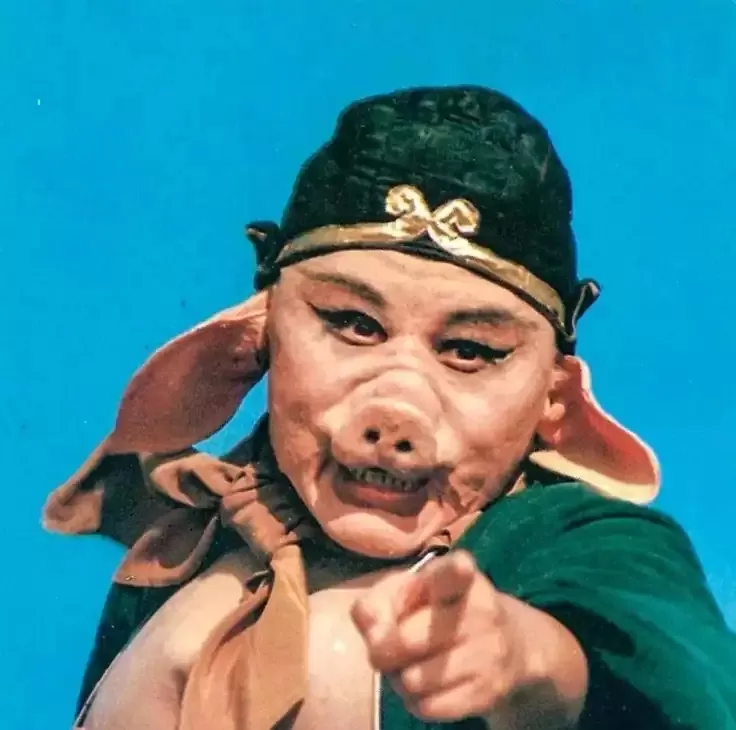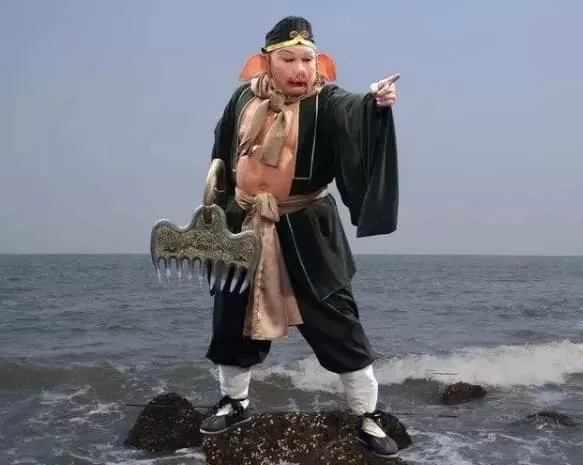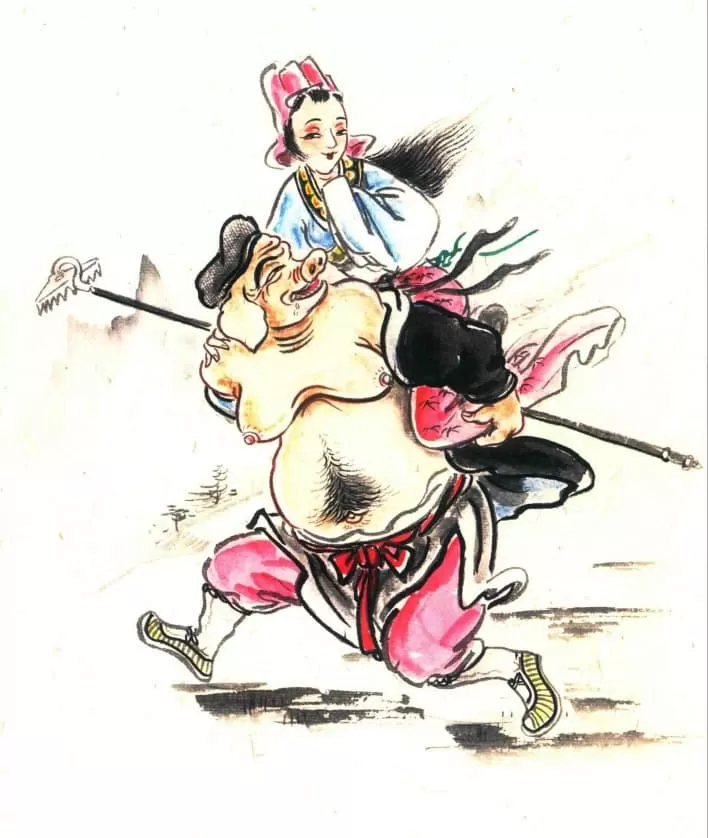
Zhu Bajie, also known as Zhu Ganglie or Zhu Wuneng, is a character from the Chinese classical novel "Journey To The West."
Originally the Marshal of the Heavenly Canopy under the Jade Emperor in Heaven, in charge of the Milky Way, he was banished to the mortal world for drunkenly flirting with Chang'e, toppling the Dipper and Bull Palace, and consuming the Queen Mother's sacred herbs. He was supposed to be reincarnated as a human but mistakenly ended up in the womb of a sow, resulting in a pig-like appearance. After descending to Earth, he "married" Lady Liu and lived in the Cloud Ladder Cave. Later, guided by the Bodhisattva Guanyin, he joined the Buddhist faith, receiving the monastic name Wuneng, and waited for the scripture-seeking monk at Gao Village, where he married into the Gao family. When Tang Sanzang passed through Gao Village on his Journey To The West, Zhu Bajie was subdued by Sun Wukong and became a disciple of Tang Sanzang. Due to his "honest" demeanor, Tang Sanzang often favored Zhu Bajie and reprimanded Sun Wukong. Zhu Bajie also frequently sowed discord, leading Tang Sanzang to expel Sun Wukong twice. It wasn't until the episode of the "Real and Fake Monkey Kings" that the master and disciples resolved their differences and united to continue their Journey To The West. When encountering demons, Zhu Bajie began to take the initiative, becoming a valuable ally to Sun Wukong. Together, they defeated many demons, including the Bull Demon King, the Nine-Headed Insect, the Leopard Demon, and the Python Demon. Although he still had a weakness for beauty, his self-control improved significantly, and he killed several female demons, such as the Jade-Faced Fox, Princess Wansheng, and the Apricot Immortal. After obtaining the scriptures, the Buddha granted Zhu Bajie the title of "Cleanser of the Altar" Bodhisattva.
Zhu Bajie embodies the qualities of human endurance, simplicity, and straightforwardness, as well as human greed and selfishness. He also possesses divine abilities and the physical characteristics of a pig, showcasing the author's perfect blend of human, divine, and porcine traits.
- "His mouth was like a dirty lotus pod, his ears like palm fans, revealing golden eyes. His tusks were as sharp as steel files, and his long mouth opened like a fiery basin. A golden helmet tightly fastened with a sash around his cheeks, and his armor was bound with a silk ribbon, the scales of a python. He held a rake with dragon-clawed nails, and a crescent-moon-shaped bow hung at his waist. His imposing demeanor intimidated the God of Time, and his lofty spirit overwhelmed the heavenly deities." (From Chapter 8 of "Journey To The West")
- "A black face with short hair, a long snout, and large ears, dressed in a robe that was neither green nor blue, tied with a floral cloth towel." (From Chapter 18 of "Journey To The West")
- "His snout was three feet long, and his tusks protruded like silver nails. His round eyes shone like electricity, and his ears flapped like fans. The bristles on the back of his neck were like iron arrows, and his rough skin was covered in green scabs. In his hand, he held a peculiar weapon, the nine-toothed rake, which struck fear into all." (From Chapter 85 of "Journey To The West")
Originally a romantic offender, he was deeply rooted in lust.
Among the three disciples, Zhu Bajie was the most straightforward. However, his contributions in overcoming obstacles like the Bramble Ridge and the Filth Alley were indispensable, and his eventual reward as the Cleanser of the Altar was well-deserved. Some say that clearing thorns is easier than removing filth, which is why Sun Wukong assisted in the Bramble Ridge, but the Filth Alley was left entirely to Zhu Bajie. Zhu Bajie was wise in the Bramble Ridge but foolish in the Filth Alley; his wisdom was attainable, but his foolishness was unmatched.
Zhu Bajie is a character whose form, name, and reality combine to create infinite comedic effect. He is the only mythological figure in the book who breaks through the veil of gods and demons, a mortal among mortals who plays out real social relationships in a vividly painted life scene. He is also the only dual persona who can freely navigate between the divine and secular worlds. Of course, he prefers the latter world, which is closed off to Tang Sanzang and mocked by Sun Wukong, but his infatuation remains unchanged.
Although Zhu Bajie is a comic character, his ugliness is distinctive and unique. He is not detestable but rather endearing, largely due to his straightforwardness. He possesses all the desires of a normal person, including flaws and shortcomings, which he hardly ever conceals.
Zhu Bajie is kind-hearted, simple, and honest, with great physical strength. He is hardworking and brave in pursuing a happy life. He assists Sun Wukong in battling demons and ghosts, contributing significantly to the completion of the pilgrimage. However, he is also selfish, lazy, family-oriented, lustful, and fond of stirring up trouble and scheming. These traits, intricately combined, make his character richly comedic.

The nine-toothed rake is the weapon used by Zhu Wuneng, a main character in "Journey To The West," written by the Ming Dynasty novelist Wu Cheng'en. Its full name is the "Upper Treasure Golden Rake," forged by the Supreme Lord Laozi with divine iron, wrapped by the Six Ding and Six Jia deities, gifted to the Jade Emperor, and finally given to Zhu Bajie as a ceremonial weapon.
The nine-toothed rake, including its handle, weighs 5,048 catties.

Lady Liu was Zhu Bajie's first wife, who died of illness a year after their marriage. When Guanyin was on her way to Chang'an, she encountered Zhu Bajie at Fuling Mountain, and Lady Liu made her first and only appearance through Zhu Bajie's narration.
Gao Cuilan is a character from the classical novel "Journey To The West." She was the daughter of the wealthy landlord Gao Taigong. When Zhu Wuneng attempted to forcibly marry her, Tang Sanzang and his disciples happened to pass through Gao Village. Sun Wukong subdued Zhu Wuneng, who then joined the pilgrimage to the West, while Gao Cuilan remained in Gao Village.
Tang Sanzang, a character from the classical novel "Journey To The West." His secular surname was Chen, childhood name Jiangliu, monastic name Xuanzang, and title Tripitaka.
Sun Wukong (also known as the Monkey King, the Great Sage Equal to Heaven, Sun the Pilgrim, and the Victorious Fighting Buddha) is the main character in the Chinese classical mythological novel "Journey To The West." Born from a magical stone created at the dawn of the world, he was born on the Flower-Fruit Mountain in the East Pūrvavideha Continent. He led a group of monkeys into the Water Curtain Cave and was revered as the "Monkey King." To learn skills, he traveled across oceans to study under the Patriarch Subodhi, who named him "Sun Wukong" and taught him the Great Sage Heaven-Soaring Art, the Seventy-Two Transformations, and the Cloud-Somersault.
Sha Wujing, also known as Sha Seng or Sha Heshang, is a character from the Chinese classical novel Journey To The West.
The White Dragon Horse, also known as the Third Prince Yulong, the Eight Legions Heavenly Dragon Horse, or the Bodhisattva of Great Strength of the Eight Legions Heavenly Dragon, is a character from the classical novel Journey To The West. He first appears in Chapter 8 of Journey To The West, titled "The Buddha Creates Scriptures to Spread Ultimate Bliss; Guanyin Receives Orders and Goes to Chang'an." He is the third son of the Dragon King of the West Sea. His prototype may have been the white horse that served as the mount of the monk Xuanzang (Tang Sanzang).
Professor Cheng Yunlei from the School of Political Science at Nantong University: Zhu Bajie is not exactly a good man, but neither is he a great villain. He is merely a common man, pursuing nothing more than food and lust. Eating is a necessity; given the chance, he would prefer to drink the nectar of the gods and eat the peaches of immortality at the Peach Banquet, but if not, he is content with porridge and steamed buns. Women are a necessity; given the chance, he would even dare to pursue a fairy like Chang'e, but if not, any female, even someone like Lady Liu, would suffice.
Provides The Most Comprehensive English Versions Of Chinese Classical Novels And Classic Books Online Reading.
Copyright © 2025 Chinese-Novels.com All Rights Reserved
